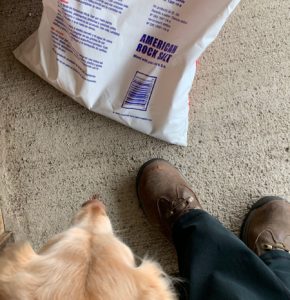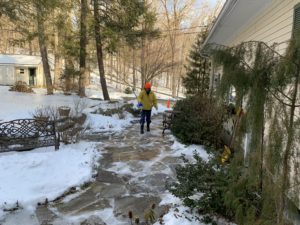Hello Fellow Readers,
This is the time of year I attend manufacturer showcases premiering new products, mostly paver or block retaining wall systems, which are made of concrete. This is also the time of year that road salt and brine are being used to de-ice our roads. Road salt and brine are not kind to concrete, though many paver manufacturers tout they are resistant to both. Primarily because they are made of high-density concrete which is twice as strong and less absorbent as poured concrete.
Road salt also called rock salt or sodium chloride (NaCl), is a mineral mined naturally. It is essentially the same as what’s in our salt shakers except its less purified, hence why it’s often grayish or brownish. Its only effective in melting snow and ice to about fifteen degrees. Below that, magnesium chloride or calcium chloride is added. And it’s the chloride ions that cause much of the environmental damage; dehydrating plants and killing small aquatic organisms. It also corrodes our cars and hurts Miss Ellie’s feet.

Road salt also called rock salt or sodium chloride (NaCl), can corrode concrete, cars, and hurt our pet’s feet.
We’ve all noticed the white lines of brine being used which is cheaper than rock salt. It doesn’t bounce off the road and it can be sprayed in advance of a storm and remain effective for up to three days. In most states brine is a combo of rock salt and magnesium chloride mixed with water. The thing is auto experts claim magnesium chloride is far more corrosive than rock salt to cars and can find its way into the nooks and crannies making it hard to wash off.
There are alternatives to brine being tried in hopes of being more environmentally kind. For example, beet wastewater from plants that process sugar beets. It turns out because of the sugars in the wastewater, it works in lower temps and adheres better than brine alone. I read that New Jersey, as well as other states, are dabbling with pickle brine which is effective in temps as low as negative six degrees. And apparently, it keeps snow and ice from bonding with the road surface. Most promising is they say it lessens the amount of chloride released into the environment by fourteen to twenty-nine percent. Then there’s cheese brine from soft cheeses like mozzarella primarily used in Wisconsin where cheese is plentiful. I can’t imagine what all these goodies smell like, but hey, whatever is kinder to our environment.
You can install radiant heat under paver walks and driveways and there’s testing underway to use solar panels to heat water in pipes installed under roads. That sure sounds less stinky. Garden Dilemmas? AskMaryStone@gmail.com
Link to a previous column: Salt Impact on Plants (& Remedies)
Excellent article on Smithsonian.com: What Happens to All the Salt We Dump On the Roads?



